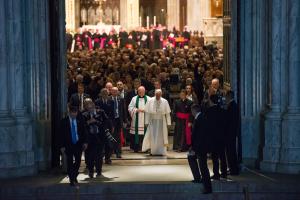
Jesus was often criticized because of the various kinds of people he wanted to help. He came to be a friend to all, including sinners, and as such, his critics accused him of being a sinner. “The Son of man has come eating and drinking; and you say, `Behold, a glutton and a drunkard, a friend of tax collectors and sinners!’” (Lk. 7:34 RSV). Some, however, recognized that something supernatural was happening around Jesus; they said that if he were a sinner, then he must also be doing all he did through the power of demons. “Now he was casting out a demon that was dumb; when the demon had gone out, the dumb man spoke, and the people marveled. But some of them said, ‘He casts out demons by Beelzebul, the prince of demons’; while others, to test him, sought from him a sign from heaven” (Lk. 11:14-16 RSV). This kind of attack, though often effective, is logically invalid, for it is fallacious, implying guilt by association.
Jesus’ critics called him many things, such as being a drunk, a sinner, a demoniac, all because of the people he associated with. He came to be in and with the poor. And while they are needy, and so received Jesus’ special attention, they were still human, and therefore, quite imperfect. Many of them were great sinners, and this was one of the reasons why Jesus wanted to be with them. “Those who are well have no need of a physician, but those who are sick; I came not to call the righteous, but sinners” (Mk. 2:17b RSV).
It has always been that those foibles, those sins, which are more likely to be seen and recognized in the poor which the rich, and people in power, have used to attack those who promote the cause of the poor (and others among the oppressed). If some among the oppressed, therefore, see help coming from elements of Marxist thought, and so engage those elements they like, they are accused of being Marxists. Marxism entails a complete system, not just mere elements of it, so to be Marxists, they would have to embrace the whole, but many of the elements lie beyond the concern and desires of the poor (indeed, if they knew them, many would be rejected by the poor, as for example, the poor tend to be religious, which traditional Marxist thought denigrated). Once the poor, or others among the oppressed, are seen as embracing Marxism, even if they are not doing so, then those who promote the cause of the poor are also seen as promoting Marxism, and this becomes the way those who seek to help them are attacked. This is why many, like Archbishop Gomez, attack social justice movements; though they might claim there is something “pseudo-religious” about them, the real objection lies in the way social justice is seen by many as being connected with Marxism.
Social justice movements are about the causes, not the individual leaders involved. The members and leaders of a particular movement will come from various backgrounds, and so might align themselves to one particular ideology or another, but the movement is not aligned to that ideology just because a particular person in it is. Each movement comes out of an injustice which needs to be righted, which means, the people involved with them will do what they can to promote change. To denounce a movement for particular people involved with them (ignoring that the people involved have a diversity of opinions and beliefs amongst themselves) is merely another way to engage guilt by association. It is the way of authoritarian control. Those in power do not want things to change; they will look to the zealots and use them as examples of the whole and denounce the whole as a way to promote their objective, which is to stay in power (or to gain even more power).
Pope Francis, of course, understands this; he understands the good in social justice movements, and indeed, how and why they are necessary, whether or not they come from a Christian source. He understood that those attacking such movements often do not care about the truth. He has been critical in the way the media ignores this as they act like all sides, all opinions in a particular debate, are equal. They are not all equal, and the media should be involved in making that known, which is why he said, “In the name of God, I ask the media to stop the logic of post-truth, disinformation, defamation, slander and the unhealthy attraction to dirt and scandal, and to contribute to human fraternity and empathy with those who are most deeply damaged.”[1] He wants us to realize the good in social justice movements, to make sure all people see the good, so that we do not attack those working for the needs of the oppressed. He wants us to know that even if they are not coming from a Christian source, they are to be respected as Good Samaritans.
Sadly, Gomez and his supporters, more than merely ignoring the pleas of Pope Francis, seem to be fighting against them and the Pope because he states them. They think they can continue to engage the debate using the same tactics as they have always done, that is, they think all they need to do is smear their opponents for their associations. It’s not just Gomez. Many bishops in the United States are contending against the teachings of the Pope, aligning themselves with Gomez over the Pope It seems as if not a day goes by without some American prelate saying or doing something which indicates they have ignored and rejected something that Pope Francis has promoted. Thus, if we look, we can see a bishop has said that they have not and do not plan on receiving a COVID vaccination after Pope Francis and the Vatican have stated the moral necessity of being vaccinated. When a bishop goes against the Pope, they always have an excuse which they offer, but it tends to be bad (such as when the bishop who does not get vaccinated says he does not need to do so because immune system is strong). The reality is that they have an agenda, and it is not one dictated by Catholic teaching or morality, but a dangerous ideology which rejects the principles of social justice, an ideology, which likewise, likes to signal its dissent (which is why the bishop made it known he did not get vaccinated).
Yes, the poor, and those who are oppressed, often are not saints. They do not have to be for us to care about them and their concerns. Jesus, after all, cared for them and promoted them in what he said and did. Dorothy Day, who was also attacked for her work for the poor, understood this, but said that this is not a good excuse to ignore their needs:
I will agree with you that the poor man is also greedy. I believe I pointed out that greed in the editorial column last month. I do not think, whoever, that we are guilty of envy or begrudging a rich man his wealth if we point out the abuses of the capitalist system which allows one man to accumulate the most of the world’s goods while other families suffer year after year, the aching pinch of poverty if not of actual destitution. St. Jerome and many many Fathers of the Church, and our Leader Himself condemned the rich and no one would dare breathe the word of envy in connection with them. [2]
We are to work for and promote the needs of all, the common good, and we do this by promoting the preferential option for the poor, lifting up those who suffer the greatest injustices. We do not have to agree with them and all they do to care for them and see they are people whose dignity have been ignored. This is why, even if we can find things which we do not like in those we support, we find those who denigrate them and seek to keep things as they are to be far worse. For God, despite all the sins one can find among the poor, still hears their cries and gives them mercy, lifting them up and promoting them over their abusers:
Yet for the poor and indigent the very rejection by the rich is sufficient to draw upon them mercy from above; for just as the hardness of heart of the prosperous and their indifference towards their fellow-slaves shuts to them the gates of the Lord’s compassion, so unmercifullness and disregard of the unfortunate opens to the latter some access to divine acceptance. [3]
Those use religion to promote the powers that be, and the injustices in the system, denigrate religion just as much as they denigrate those they abuse. It is that kind of religious person, that kind of Pharisee (not all Pharisees were like this), which Jesus criticized. When we are critical of religious authorities who act like this, therefore, we are not being critical of religious authority as a whole, but its abuse. A good bishop is a servant, looking after their flock, promoting justice, while bad ones look for ways to get more and more power for themselves, helping their friends and associates loot the system for all it is worth, leaving more and more people disenfranchised; thus, they resemble the way St Jerome described bad Pharisees:
But the Pharisees were zealous for this one precept, namely, the accumulation of what had been commanded. Other things that were of greater importance mattered little to them. They did not care whether anyone did them or not. And so, he accuses them of greed on this point, that they zealously exact a tithe even of common herbs, yet they neglect justice in business disputes, and mercy toward the poor and orphan and widows, and faithfulness to God, which are great matters.[4]
St. Isidore of Seville, likewise, made it clear how many church leaders fall into grave sin because they do not use their authority properly, but rather, seek friendship with the rich and powerful so as to become their servants instead of servants of God:
Many leaders of the churches, fearing that they will lose the friendship and incur the hostility of those who hate them, do not correct those who sin, and they are afraid to rebuke those who oppress the poor; nor are they afraid of the severity of the retribution that will be handed out to them, due to the fact that they have been silent about the common people entrusted to their care.[5]
Those bishops which neglect justice, those who will attack social justice policies and those movements which seek to put them into place, harm the poor and the oppressed for the sake of the rich and powerful. They might like to show themselves off as great men of religious authority, but they also show themselves to be far from the religious sentiment they are meant to hold: “Religion that is pure and undefiled before God and the Father is this: to visit orphans and widows in their affliction, and to keep oneself unstained from the world” (Jas. 1:27 RSV).
Social justice is important. True religion cannot ignore it. But sadly, many with positions of power and authority sell their souls for money, and in doing so, find themselves slaves to the rich and powerful instead of serving Christ. They have become stained by the world. They neglect the teachings of Christ as they fight against those who would promote the common good. They attack those who engage social justice with the same kind of denunciations Jesus’ critics used to attack Jesus. They engage guilty by association, trying to smear those who promote justice. They want the faithful to ignore social justice. But the faithful know they can’t.
[1] Pope Francis, “Video Messages on the Fourth World Meeting of Popular Movements.” Vatican translation. ¶2.
[2] Dorothy Day, “Letter To Fr. Anthony Wolf. November 13, 1934” in All The Way To Heaven: The Selected Letters of Dorothy Day. Ed. Robert Ellsberg (New York: Image Books, 2010), 86.
[3] St. Photius, The Homilies of Photius, Patriarch of Constantinople. Trans. Cyril Mango (Harvard: Harvard University Press, 1958; repr. Eugene, OR: Wipf & Stock, 2017), 63 [Homily 2].
[4] St. Jerome, Commentary on Matthew. Trans. Thomas P. Scheck (Washington, DC: CUA Press, 2008), 263.
[5] St. Isidore of Seville, Sententiae. Trans. Thomas L. Knoebel (New York: Newman Press, 2018), 195.
Stay in touch! Like A Little Bit of Nothing on Facebook.
If you liked what you read, please consider sharing it with your friends and family!
















